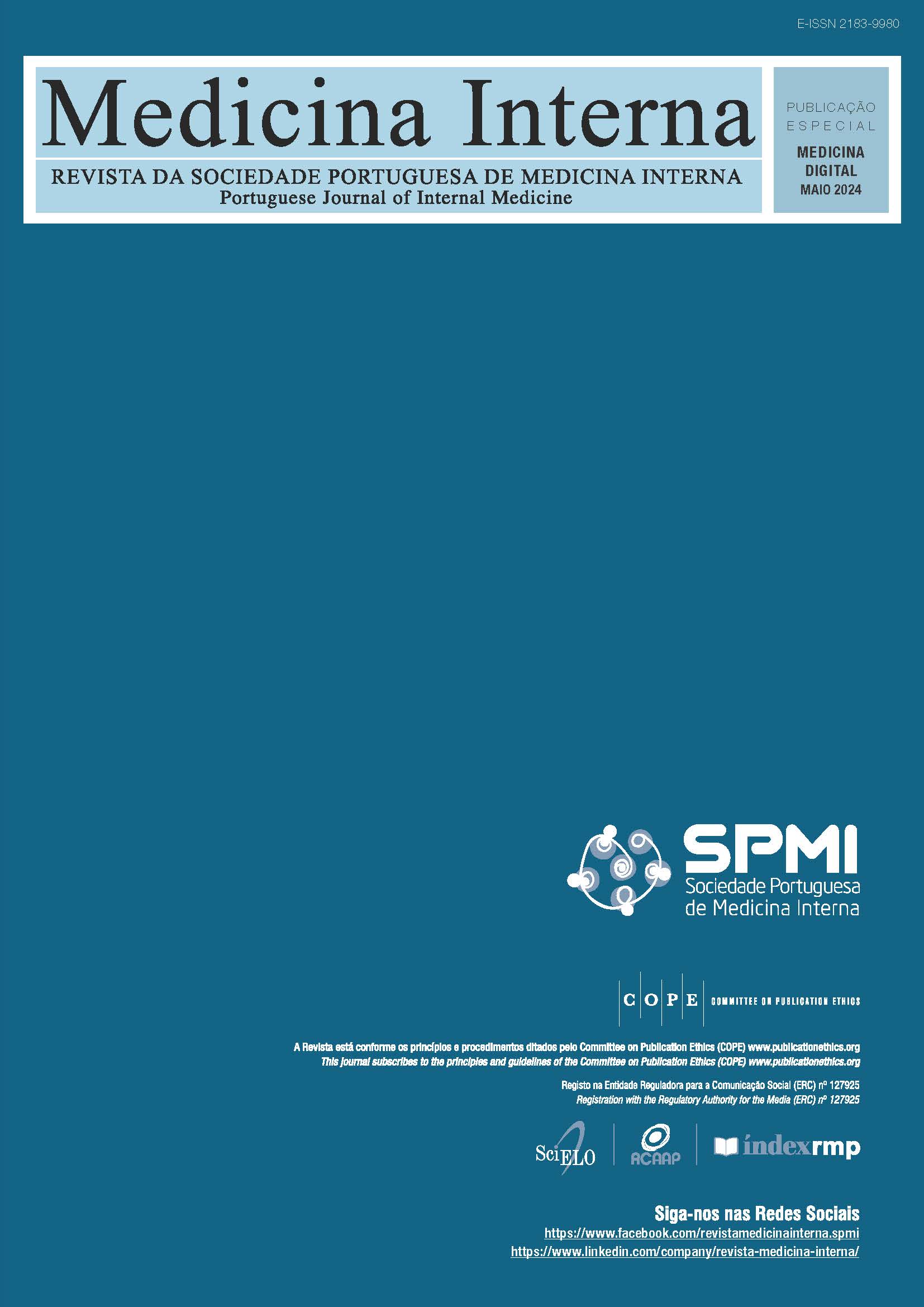Diabetes in the Digital World
DOI:
https://doi.org/10.24950/rspmi.2586Keywords:
Artificial Intelligence, Diabetes Mellitus, Digital Health, TechnologyAbstract
Despite constant pharmacological evolution, diabetes is a particular condition whose control is hard and laborious to achieve. Several aspects contribute to this difficulty. Chronic and acute complications of diabetes represent loss in quality of life and have a significant impact on resource consumption and global health costs.
Technological developments have contributed considerably to the paradigm shift in the reality of those who work in diabetes and those who live with the disease. The incorporation of digital technology and artificial intelligence in diabetes adds value and has already been implemented in clinical practice. This alliance leads to the existence of professionals who are more aware of the health status of people with diabetes, who become much more capable themselves and self-sufficient to manage their own condition.
Downloads
References
Diabetes – Factos e Números. Relatório Anual do Observatório Nacional de Diabetes – edição de 2023. [accessed Jan 2024] Available at: https://www.spd.pt/#/observatorio-da-diabetes.
Klonoff AN, Andy Lee WA, Xu NY, Nguyen KT, DuBord A, Kerr D. Six Digital Health Technologies That Will Transform Diabetes. J Diabetes Sci Technol. 2023;17:239-49. doi: 10.1177/19322968211043498.
World Health Organization. mHealth: new horizons for health through mobile technologies. Based on the findings of the second global survey on eHealth. Global Observatory for eHealth series – Vol. 3. Geneva: WHO; 2011.
Bankmycell.com. How many phones are there in the world? 1 billion more mobile connections than people worldwide. 2019. [accessed Jan 2024] Available at: https://www.weforum.org/agenda/2023/04/charted-there-are-more-phones-than-people-in-the-world/
Bergenstal RM, Johnson M, Powers MA, Wynne A, Vlajnic A, Hollander P,et al. Adjust to target in type 2 diabetes: comparison of a simple algorithm with carbohydrate counting for adjustment of mealtime insulin glulisine. Diabetes Care. 2008;31:1305-10. doi: 10.2337/dc07-2137.
Battelino T, Danne T, Bergenstal RM, Amiel SA, Beck R, Biester T, et al. Clinical Targets for Continuous Glucose Monitoring Data Interpretation: Recommendations from the International Consensus on Time in Range. Diabetes Care. 2019;42:1593-603. doi: 10.2337/dci19-0028.
Gomez-Peralta F, Choudhary P, Cosson E, Irace C, Rami-Merhar B, Seibold A. Understanding the clinical implications of differences between glucose management indicator and glycated haemoglobin. Diabetes Obes Metab. 2022;24:599-608. doi: 10.1111/dom.14638.
Lin YK, Groat D, Chan O, Hung M, Sharma A, Varner MW, et al. Alarm Settings of Continuous Glucose Monitoring Systems and Associations to Glucose Outcomes in Type 1 Diabetes. J Endocr Soc. 2019; 19;4:bvz005. doi: 10.1210/jendso/bvz005.
Adolfsson P. Increased Time in Range and Fewer Missed Bolus Injections After Introduction of a Smart Connected Insulin Pen. Diabetes Technol Ther. 2020;22:709-18. doi: 10.1089/dia.2019.0411.
Heinemann L, Schnell O, Gehr B, Schloot NC, Görgens SW, Görgen C. Digital Diabetes Management: A Literature Review of Smart Insulin Pens. J Diabetes Sci Technol. 2022;16:587-95. doi: 10.1177/1932296820983863.
Conroy DE, Yang CH, Maher JP. Behavior change techniques in top-ranked mobile apps for physical activity. Am J Prev Med. 2014;46:649–52. doi: 10.1016/j.amepre.2014.01.010
AlZu’bi S, Elbes M, Mughaid A, Bdair N, Abualigah L, Forestiero A, et al. Diabetes Monitoring System in Smart Health Cities Based on Big Data Intelligence. Future Internet. 2023;15:85. doi: 10.3390/fi15020085
Gessa A et al. Quality Assessment of Health-apps using a Public Agency Quality and Safety Seal. The Appsaludable Case. J Med Syst. 2021; 45;73. doi: 10.1007/s10916-021-01748-1
World Health Organization Regional Office for Europe The ongoing journey to commitment and transformation: digital health in the WHO European Region, 2023. Copenhagen: WHO Regional Office for Europe; 2023.
Lakerveld J, Palmeira AL, van Duinkerken E, Whitelock V, Peyrot M, Nouwen A. Motivation: key to a healthy lifestyle in people with diabetes? Current and emerging knowledge and applications. Diabet Med. 2020;37:464-72. doi: 10.1111/dme.14228.
Barnard KD, Lloyd CE, Dyson PA, Davies MJ, O'Neil S, Naresh K, Lawton J, et al. Kaleidoscope model of diabetes care: time for a rethink? Diabet Med. 2014;31:522-30. doi: 10.1111/dme.12400.
Ribeiro RT, Nascimento do Ó, Eusébio L. eDiabetes©: Protocolo de Implementação de um Programa Colaborativo de Apoio à Auto-gestão e Literacia Digital na Diabetes Tipo 2. R.P.D. 2021; 16: 112-7
World Health Organization.Ensuring people-centred diabetes care during the COVID-19 pandemic - Experiences from Portugal. Geneva: WHO; 2020.
Polychronidou E. DM4ALL: A user-centered system for collaborative diabetes management. Diabetes Technol Therap. 2021;23:A-1-A-206.
Ribeiro RT, Andrade R, Nascimento do Ó D, Lopes AF, Raposo JF. Impact of blinded retrospective continuous glucose monitoring on clinical decision making and glycemic control in persons with type 2 diabetes on insulin therapy. Nutr Metab Cardiovasc Dis. 2021;31:1267-75. doi: 10.1016/j.numecd. 2020.12.024.
Zhou W, Sailani M R, Contrepois, K. Zhou Y, Ahadi Sal Leopold RS. Longitudinal multi-omics of host–microbe dynamics in prediabetes. Nature. 2019; 569:663–71. doi: 10.1038/s41586-019-1236-x
Abràmoff MD, Lavin PT, Birch M, Shan N, Folk CJ. Pivotal trial of an autonomous AI-based diagnostic system for detection of diabetic retinopathy in primary care offices. 2018. NPJ Digit Med. 1:39. doi: 10.1038/s41746-018-0040-6.
Nimri R, Battelino T, Laffel LM, Slover RH, Schatz D, Weinzimer SA, et al. NextDREAM Consortium. Insulin dose optimization using an automated artificial intelligence-based decision support system in youths with type 1 diabetes. Nat Med. 2020;26:1380-84. doi: 10.1038/s41591-020-1045-7.
Nomura A, Masahiro N, Mitsuhiro M, Kenji Furukawa, Takashi Y. Artificial intelligence in current diabetes management and prediction. Curr Diab Rep. 2021;21:61. doi: 10.1007/s11892-021-01423-2.
Downloads
Published
How to Cite
Issue
Section
License
Copyright (c) 2024 Internal Medicine

This work is licensed under a Creative Commons Attribution-NonCommercial 4.0 International License.
Copyright (c) 2023 Medicina Interna






